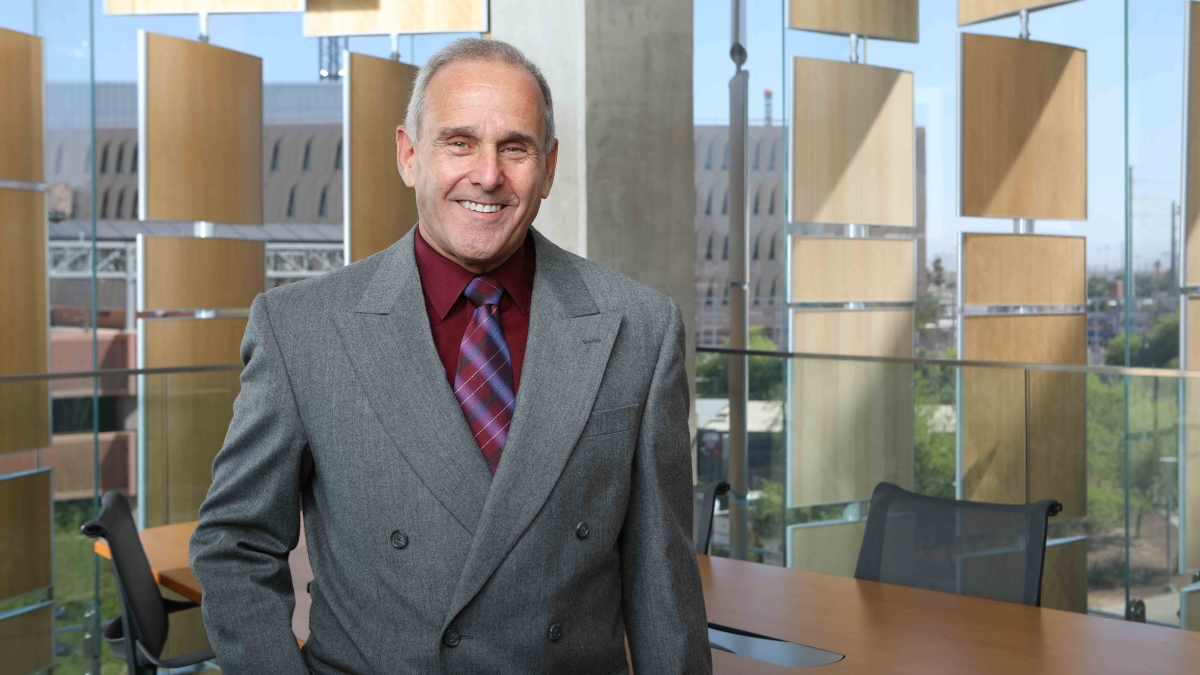Hometown boy makes good leading ASU Biodesign Institute

Josh LaBaer leads one of the world’s most impactful research institutions — the ASU Biodesign Institute — where he oversees extensive interdisciplinary research efforts to solve some of the greatest challenges facing humans and the planet. Courtesy photo
Editor’s note: The Biodesign Institute at Arizona State University is celebrating its landmark 20th anniversary. This story is part of a series to recognize and celebrate the discoveries made at the institute, as well the people who are developing these impactful innovations.
Growing up in an era when Phoenix was a sleepy Southwestern town, Josh LaBaer was your typical kid — spending long summer days riding his bike around town with friends, cruising through an easy-going childhood that marked a different era in American life.
After spending his formative years in Arizona, he moved to Berkeley, California, ready to take on a life as an undergraduate at UC Berkeley. There, his journey would take an unexpected turn, pushing him toward a new passion for discovery that has driven his every decision since that time.
Today, he’s setting a different pace — urgently leading a diverse team of scientists as they seek nature-inspired solutions to address many of the world’s greatest challenges, including infectious diseases and cancer; removing contaminants from air and water; immunotherapies; and the application of nanotechnology for biomedicine.
Dr. LaBaer directs one of the world’s most impactful and complex research institutions — the Biodesign Institute at Arizona State University. He also leads the Biodesign Virginia G. Piper Center for Personalized Diagnostics and is the Piper Chair in Personalized Medicine.
“I love what I do in terms of leading the institute. I have the best job at ASU, in my view, because I get to hunt down and hire really brilliant scientists who are solving huge problems and I get to work with them on a daily basis,” LaBaer said.
As one of the nation’s foremost investigators in the field of personalized diagnostics, he discovers and validates biomarkers that can provide early warning for those at risk of major illnesses, including cancer and diabetes.
LaBaer earned a medical degree and doctorate in biochemistry and biophysics from the University of California, San Francisco. He completed his internship and residency in internal medicine at the Brigham and Women’s Hospital and a clinical fellowship in medical oncology at the Dana-Farber Cancer Institute, both in Boston. He was board-certified in internal medicine and medical oncology and was an instructor and clinical fellow in medicine at Harvard Medical School.
He has also contributed more than 280 original research publications, reviews and chapters.
The Biodesign Institute, pioneered by visionary plant biologist Charles Arntzen and supported by the leadership of ASU President Michael Crow and previous directors Drs. George Poste and Ray DuBois, has garnered more than $930 million in research funding over the past 20 years and is estimated to have an annual impact of $265 million on Arizona’s state economy.
Since 2016, LaBaer’s dynamic leadership and engaging, innovative style have fostered the formation of new, interdisciplinary centers that address the problems facing people and the planet. Currently, 17 centers and hundreds of scientists are working on more than 300 active research projects to address many of the world’s greatest challenges, including cancer, vaccine development, emerging diseases, environmental issues, sustainability and immunotherapies. The institute is even developing the world’s first compact X-ray free electron laser — a particle accelerator that fits in a basement at the institute.
“I'm hoping to make a difference here by putting a big focus on the young professors,” LaBaer said. “I want to bring in new center directors who are committed to hiring young faculty and developing their careers. I think that's a key element of what we do.
“I really hope we grow as an institute — the centers, the faculty and, of course, the students and postdocs who work in those centers,” LaBaer said. “Ultimately, what we do is all about people. Everything in science is all about people, and building those minds and careers is critical to our future.”
As for his future?
“I enjoy the multiple roles that I play here. I enjoy teaching,” LaBaer said. “I don't think I would ever give up my laboratory work. I think what we do in the lab is just too much fun. It's the hardest thing I do. Making discoveries and running a team and getting funding and getting papers out is a lot of work. But we're committed to developing new technologies and making a positive impact in the world.”
More Science and technology

Science meets play: ASU researcher makes developmental science hands-on for families
On a Friday morning at the Edna Vihel Arts Center in Tempe, toddlers dip paint brushes into bright colors, decorating paper fish. Nearby, children chase bubbles and move to music, while…

ASU water polo player defends the goal — and our data
Marie Rudasics is the last line of defense.Six players advance across the pool with a single objective in mind: making sure that yellow hydrogrip ball finds its way into the net. Rudasics, goalkeeper…

Diagnosing data corruption
You are in your doctor’s office for your annual physical and you notice the change. This year, your doctor no longer has your health history in five-inch stack of paperwork fastened together with…

